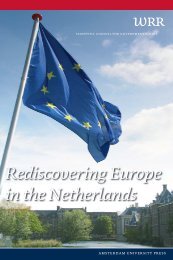The Western Condition - St Antony's College - University of Oxford
The Western Condition - St Antony's College - University of Oxford
The Western Condition - St Antony's College - University of Oxford
You also want an ePaper? Increase the reach of your titles
YUMPU automatically turns print PDFs into web optimized ePapers that Google loves.
An ambivalent decade: Three variations in the AKP’s foreign policy<br />
period that the AKP government’s Iranian policy came to be increasingly portrayed within<br />
western foreign policy circles as a ‘litmus test’ <strong>of</strong> Turkey’s commitment to the US-led western<br />
security alliance. 72 In 2007, in a testimony before the US Commission on Security and<br />
Cooperation in Europe, Soner Çağaptay, a director at the neo-conservative Washington Institute<br />
for Near East Policy, quipped:<br />
It is ironic that every time the U.S. <strong>St</strong>ate Department says the right things on how<br />
we are together with Turks in fighting the PKK and we will deliver security,<br />
promising the right things, that same day the Iranians bomb PKK camps. So this<br />
is how you read the news in the Turkish press: front page, big headlines, ‘Iranians<br />
Have Bombed PKK Camps’ -12th page, one column, ‘<strong>The</strong> U.S. Has Said <strong>The</strong>y’ll<br />
Support against the PKK.’ In this regard Iranians walk the walk and they make it<br />
look as if the Americans are only talking the talk. And that’s a huge problem. 73<br />
Motivated by these developments, the AKP government turned a blind eye to the heavy handed<br />
crackdown on anti-government demonstrations in Iran following its disputed presidential<br />
election in 2009. It also adopted a conciliatory tone on the nature <strong>of</strong> the Iranian nuclear<br />
programme, emphasising the country’s right to uranium enrichment for civilian purposes. In<br />
May 2010, shortly before the sanctions vote at the UN Security Council, Turkey and Brazil got<br />
Iran to agree to a uranium swap deal, based on the proposal set forth by the P5+1 (US, Britain,<br />
France, Russia, China + Germany) in Geneva the previous year. Hailed as a breakthrough by<br />
Turkish and Brazilian diplomats, the agreement caught western leaders <strong>of</strong>f guard and was<br />
eventually ignored as a ‘delaying tactic’ on the part <strong>of</strong> the Iranian regime. 74 As a display <strong>of</strong> its<br />
newfound autonomy and self-confidence, Turkey, a non-permanent member <strong>of</strong> the Security<br />
Council at the time, voted against resolution 1929 imposing international sanctions on the<br />
Islamic Republic; the only country to do so besides Brazil. This was probably a lost opportunity<br />
on both sides to harness Turkey’s zero problems strategy for the benefit <strong>of</strong> deflating the world’s<br />
nagging problems, as the Iranian nuclear question certainly is.<br />
We should note that during this period, Turkish foreign policy was also affected by and gradually<br />
came to reflect the changing tone <strong>of</strong> politics and power relations inside the country. At various<br />
points, the increasingly confrontational rhetoric <strong>of</strong> a visibly self-assured ruling party, its more<br />
palpable Islamic bias and the seemingly unrelenting ambition <strong>of</strong> Prime Minister Erdoğan to take all<br />
matters, domestic and foreign, into his own hands, challenged Davutoğlu’s more subtle and<br />
process-driven method. <strong>The</strong> remarkable fallout between the AKP and the Israeli government after<br />
72 F. <strong>St</strong>ephen Larrabee, ‘Turkey Rediscovers the Middle East’, Foreign Affairs, 86 (4), 2007, pp. 103 – 114.<br />
73 Quoted in Daphne McCurdy, ‘Turkish – Iranian Relations: When Opposites Attract’, Turkish Policy Quarterly, Vol.<br />
7, No. 2, 2008, p. 96.<br />
74 Only two days before, the US Secretary <strong>of</strong> <strong>St</strong>ate Hillary Clinton had dismissed the duo’s attempts as futile. David<br />
E. Sanger and Michael Slackman, ‘U.S. Is Skeptical on Iranian Deal for Nuclear Fuel’, New York Times, 17 May 2010.<br />
34

















